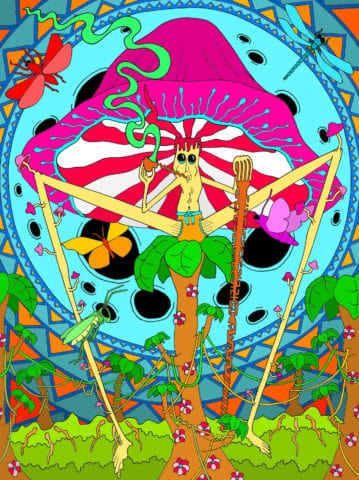Despite being used for spiritual and medical purposes for thousands of years, psychedelics have become almost entirely dismissed as a viable medicinal option in the last century. In recent years, however, public perceptions about these medicines have begun to change for the better.
There has been very little activity in research and testing for psychedelic drugs in Canada since the 1960s, but in recent years, there has been a significant uprising of interest in psychedelic medicine. Being called a “psychedelic renaissance,” this modern day revisiting is gaining traction and regaining the ground lost during the last 40 years of the war on  drugs.
drugs.
Erika Dyck, a history professor at the University of Saskatchewan, is helping to stimulate conversation and educate people on psychedelic history. These conversations serve educational purposes about drugs themselves, but they also attempt to retract the myths that have led to the stigmatization of psychedelics.
With this education comes a call for more stringent and proper scientific testing and a more reasonable way forward in harnessing the effects of psychedelics for both medicinal and spiritual purposes.
On Nov. 23, 2016, Dyck began this educational process by hosting An Evening Of Psychedelics at the Underground Café in Saskatoon. I walked in 15 minutes early to almost no available seating.
By the time the event began, the building was packed wall to wall, with people sitting on the ground and standing by the front door. On Nov. 25, I was lucky enough to sit down with Dyck for almost an hour to talk about the event.
An Evening of Psychedelics included four speakers, who each presented on a different aspect of psychedelics, ranging from mescaline research to the importance of setting, through to the history and legal aspects of psychedelic medicine.
“There really does seem to be a growing appetite for a series of conversations about this,” Dyck said.
While Kenneth Tupper of the University of British Columbia gave a presentation on a similar topic in Saskatoon in August 2016, An Evening of Psychedelics was one of the very first public panel discussions regarding psychedelics in recent memory and the first of this magnitude.
That growing appetite truly does exist. Completely filling a building with people looking to get more educated and play a part in the new wave is a great indicator of the potential for psychedelic innovation in this city.
The public’s perception is really starting to change towards psychedelics. With all the discussions happening across the world, a new era of access to information and prominent writers publishing books and articles about the topics, people are starting to accept that psychedelic medicine is a viable treatment for things like post-traumatic stress disorder, depression and addiction.
The psychedelic revolution of the 1960s was led by youth culture, and it seems that a new young generation is once again leading the charge. An Evening of Psychedelics primarily featured people under 30, many of whom had previously experienced the effects of psychedelics and seen first-hand the positive life-changing qualities they provide.
The importance of these conversations lies not only within psychedelic education, but furthermore, with how to appropriately and successfully move forward. The 1960s saw a movement of revolutionary proportions, which unfortunately only did more to stigmatize these drugs rather than harness their medicinal potential.
Conversations from both the scientific side and the spiritual side of the psychedelic spectrum need to take place and An Evening of Psychedelics did just that. Those two sides typically don’t interact with each other too much, but both play an important role in this renaissance. Policy implementations need to be put forth carefully — and backed with the hard science that exists — to prove that psychedelics have positive medicinal and spiritual benefits.
There is still a lot to learn and much discussion to be had about this topic. While growing in popularity, psychedelics still sit on the fringes of society, but with more events like this one, we could be due for a complete evolution of public perception towards psychedelic medicine.
—
Travis Hebert
Graphic: Mike T.
Leave a Reply